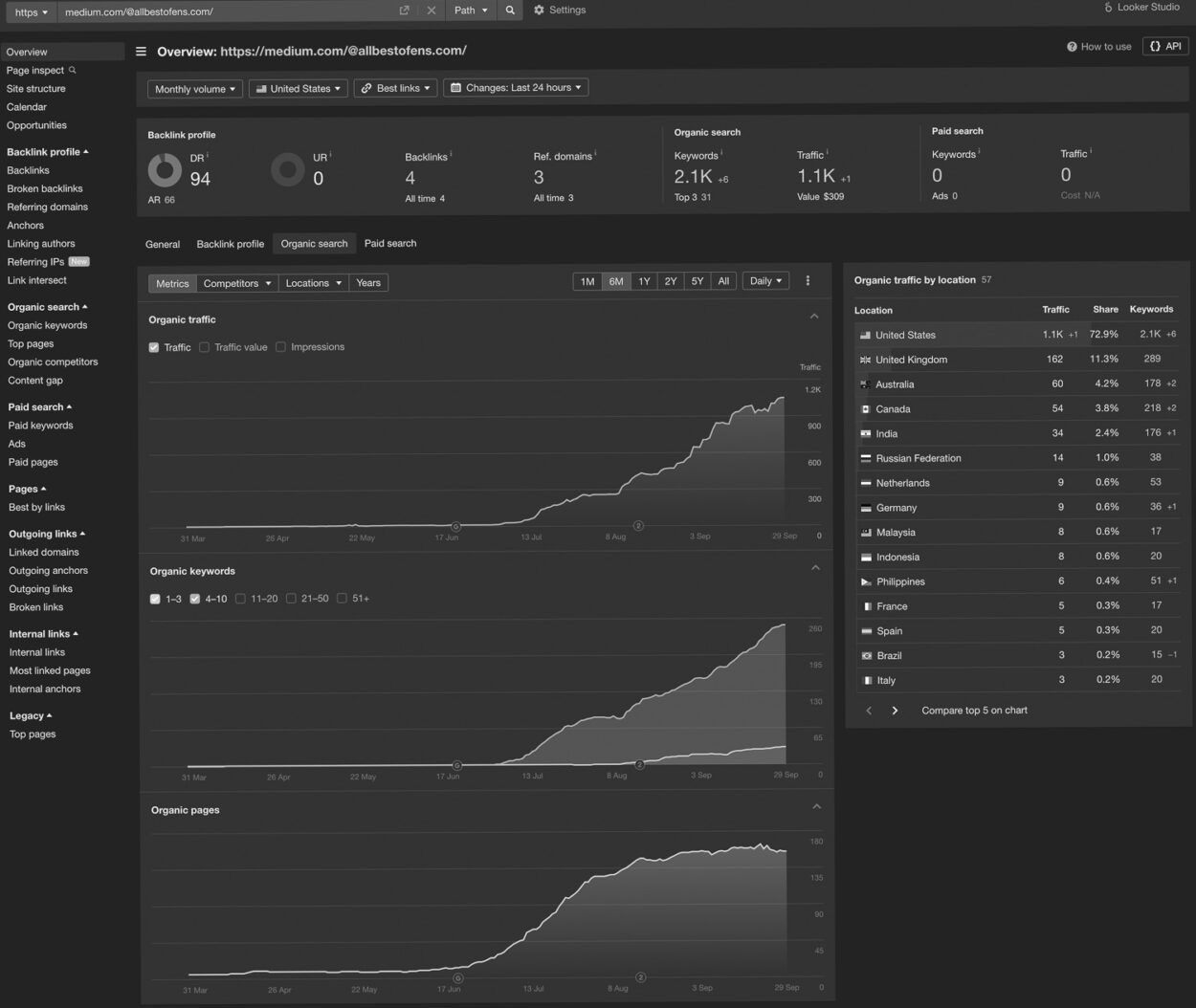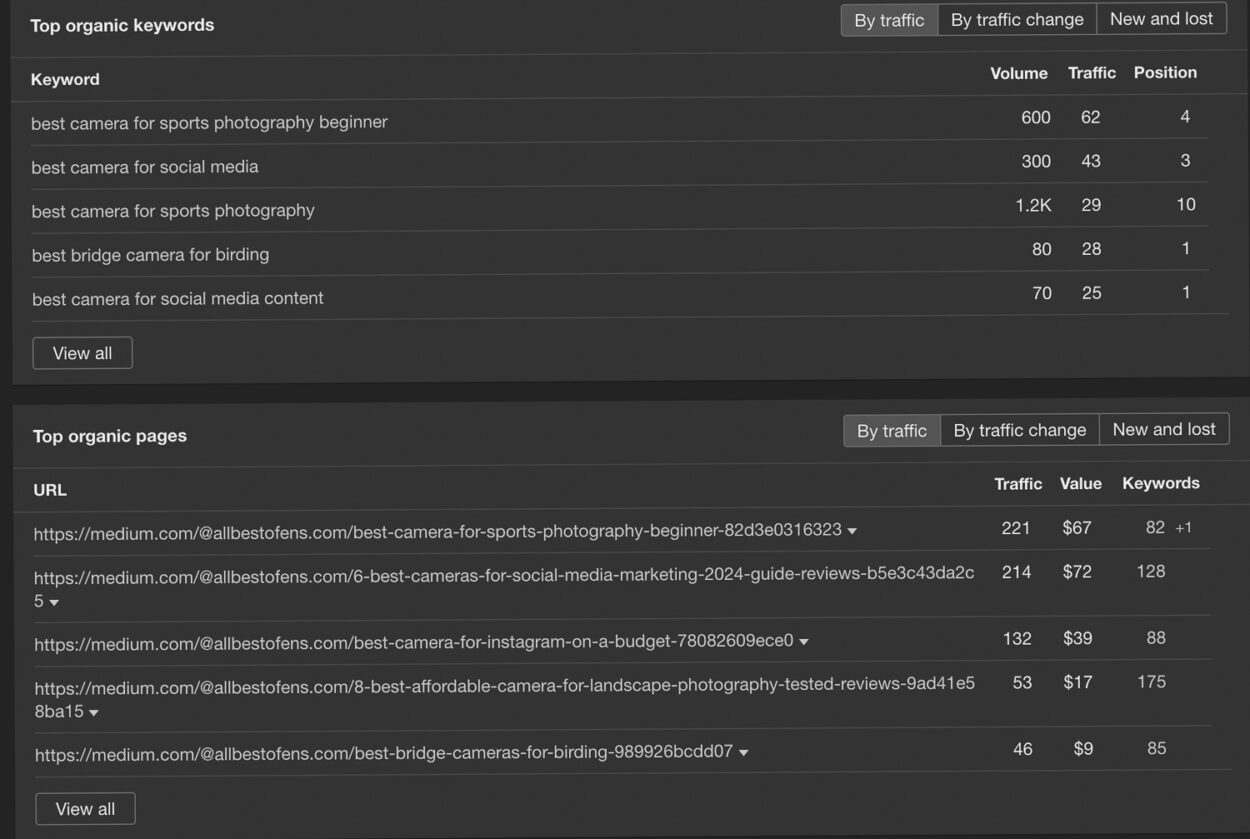Ranking for competitive keywords on Google is difficult, but Medium.com offers a shortcut thanks to its high Domain Rating (DR) of 94. This SEO boost allows content to rank quickly, even for highly competitive terms. However, this strategy raises questions about long-term sustainability, especially when the author lacks traditional EEAT (Experience, Expertise, Authoritativeness, Trustworthiness) signals.
This post focuses on how certain users have managed to rank for competitive keywords despite minimal EEAT factors—such as inactive LinkedIn profiles or expired personal websites—by leveraging Medium’s domain strength.
Why Medium?
Medium’s high DR enables content to rank more easily than on smaller or newer domains. For some users, this provides a way to bypass the usual challenges of building domain authority from scratch. The platform’s key advantages include:
- High Domain Authority: Medium’s strong DR allows content to rank faster and higher on search engines.
- Traffic Potential: Even without personal authority or a robust web presence, Medium’s domain strength can still drive significant organic traffic.
- SEO-Friendly Features: Medium’s built-in SEO tools—such as tags, internal linking, and a clean structure—assist in fast indexing and ranking.
Example: A High-Ranking Strategy with Minimal EEAT

Ahrefs screenshot illustrating the rapid growth in organic traffic and keyword rankings for a Medium.com article over the last six months. This highlights the potential of Medium’s high domain authority to rank quickly for competitive keywords, as discussed in the blog post.
Despite lacking a robust personal web presence, one user achieved significant keyword rankings by leveraging Medium’s platform:
- Best camera for sports photography beginner – Ranked 4th, with 600 monthly searches.
- Best camera for social media – Ranked 3rd, with 300 monthly searches.

Ahrefs data highlighting the top organic keywords and pages for a Medium.com publication. The site ranks highly for competitive keywords such as ‘best camera for sports photography beginner’ and ‘best bridge camera for birding,’ showcasing the platform’s capability to achieve strong SEO performance even in highly contested niches.
These results show that even without a personal EEAT foundation, Medium’s domain strength can enable articles to compete with established photography sites, simply by hosting the content on the platform.
Key Insights from Ahrefs Data
The Ahrefs data reveals the power of Medium’s domain authority for individuals leveraging the platform:
- Over 2,100 Keywords Ranked: The user’s Medium profile ranks for thousands of keywords, driving over 1.1K organic visitors per month.
- Competing with Established Sites: Despite minimal online credibility, the content competes with industry-specific websites like Digital Camera World, thanks entirely to Medium’s high DR.
- Lack of EEAT: Although the user has minimal online credibility (e.g., inactive LinkedIn or expired personal domain), Medium’s domain strength keeps the rankings intact.
How to Use Medium for Ranking Competitive Keywords
If you want to rank for competitive keywords using Medium, here’s what you should do:
- Focus on High-Volume Keywords: Use tools like Ahrefs to find competitive keywords that would be difficult to rank for on your own domain.
- Generate Content Efficiently: While creating high-quality, valuable content is ideal, even low-quality, AI-generated content can perform well on Medium due to its domain authority. However, relying on low-effort content may not be sustainable if Google further prioritizes EEAT in the future.
- Optimize for SEO: Ensure your title, meta description, and headers are keyword-optimized. Take advantage of Medium’s tagging system for better visibility.
- Use Internal Linking: Link to other relevant articles on Medium to strengthen your SEO performance and increase content authority.
- Monitor Performance: Use Medium’s built-in analytics tools to track your article’s views, reads, and referrers. For deeper keyword tracking and performance on search engines, rely on third-party tools like Ahrefs or SEMrush, as Medium does not support external tracking with Google Search Console or Google Analytics.
Long-Term Sustainability: The EEAT Challenge
While this case study highlights Medium’s potential for quick rankings, it also underscores the risks of relying solely on platform authority. Google’s emphasis on EEAT is growing, and future algorithm updates could penalize users who lack personal expertise or credibility. If Google begins prioritizing individual authority over platform authority, Medium-based rankings like these could suffer, especially for low-quality or AI-generated content.
Conclusion
Medium.com offers a fast way to rank for competitive keywords, as demonstrated by this user’s success. However, this strategy may not be sustainable in the long term, especially with Google increasingly focusing on EEAT. While Medium’s authority can help you rank quickly, building your own expertise and online credibility will provide more lasting benefits.
To make Medium a more sustainable and profitable strategy, consider applying to its Partner Program, which rewards high-quality content with monetary compensation. For more information on how to succeed in Medium’s Partner Program, check out our guide on optimizing earnings through Medium’s Partner Program.
